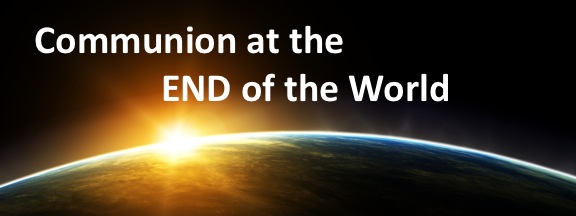“The idea of the end that can be known and that it is a fate that is shared by all is oddly appealing in an individualistic culture where many people feel alone and where control is understood as defining one’s dignity.”
Recently, there has been a lot of talk about the end of the world. As with many musings about the end of times, many of these latest predictions reveal what I see as a fundamental aspect of human existence—a desire for communion and meaning.
Unfortunately these latest doomsday predictions come with the exploitation of Mayan people—a rich culture that faces far more serious challenges and injustices than those of the fanciful imagination. Instead of actually engaging the Mayan culture and people in their daily struggles in the wake of colonialism and systematic marginalization, this culture is reduced to a caricature alongside Stonehenge and the Egyptian Pyramids. But this is the subject of another post.
Beyond the cultural exploitations of the Mayan people, I believe that the recent interest in the end of the world highlights something important. Many of the fears and false hopes about “the end” appear to reflect a sense of isolation and dislocation. The idea of the end that can be known and that it is a fate that is shared by all is oddly appealing in an individualistic culture where many people feel alone and where control is understood as defining one’s dignity.
In a sense, I believe the obsessions with the “end” reflect a longing and desire for meaning and, if you will, communion. We can see this longing for communion in the basic plot line that is shared by many disaster movies and TV shows.
Many disaster movies go like this:
- People discover something that threatens to destroy the earth.
- Insert asteroid/aliens/volcano/super storm/plague
- A team of ordinary (often troubled and excluded people) are called upon to stop the disaster.
- With some creative thinking and help from unexpected places, the disaster is averted.
- In the process of combating the asteroid/aliens/volcano/super storm/plague humanity discovers that there is more uniting us than dividing us.
- Queue the almost cheesy scenes of Arabs and Israelis working together, blacks and whites embracing, estranged relationships being healed, etc.
- In short, after the disaster no one is isolated.
Here is where I think the hit TV Show the Walking Dead gets it wrong. Instead of showing people coming together in the face of a disaster, the Walking Dead depicts humanity fracturing apart into competitive bands.
This is contrary to experience however. In the midst of many disasters, people generally come together. Instead of descending into a Hobbesian world where each person looks out for themselves, experience show us that most people come together in an  emergency. This was the case in the sufferings of Katrina and much to the surprise of many was also the case in New York during and after Sandy. Warm generosity overflowed into the streets of a city often seen as unfriendly and cold. Occupy Sandy members, church groups, the Sikh Community and so many others individuals and groups gave their time, talents and treasures to help others.
emergency. This was the case in the sufferings of Katrina and much to the surprise of many was also the case in New York during and after Sandy. Warm generosity overflowed into the streets of a city often seen as unfriendly and cold. Occupy Sandy members, church groups, the Sikh Community and so many others individuals and groups gave their time, talents and treasures to help others.
Of course, the “freak out” (as one NPR commentator called it) over the end of the world like any sense of communion we might get from watching a disaster movie is fleeting. Only the true communion and union in God will satisfy our restless and isolated hearts.
And to find this, we will have to admit that we do not know when and how the end will be (as the Christian tradition teaches). We have to find ways to open ourselves to others today and not wait for some disaster and we have to admit that we are vulnerable and not in control—and paradoxically there something very liberating about this.
Comments? Thoughts?


You must be logged in to post a comment.